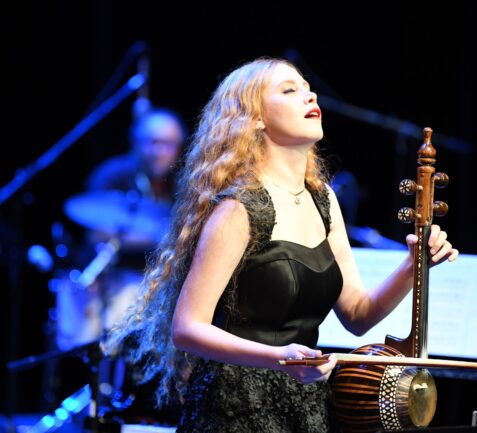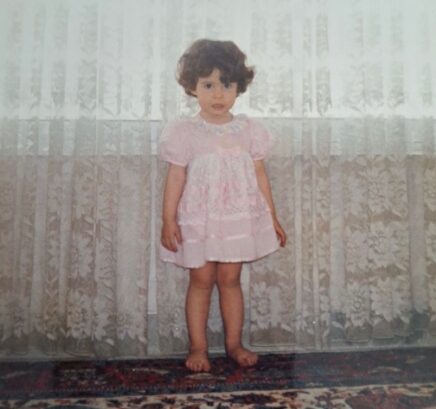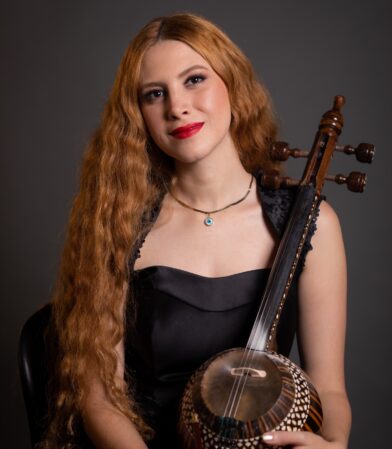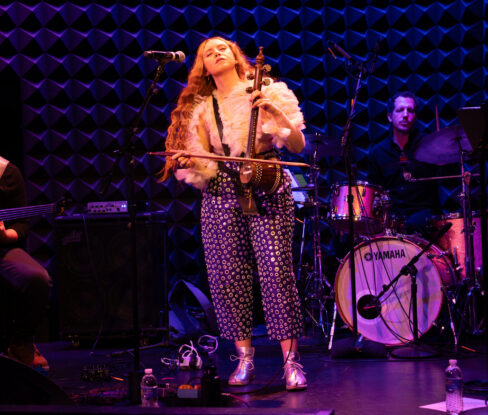Mehrnam Rastegari is a violinist, composer, vocalist, and Kamancheh player. Iranian-born, Rastegari lives in New York City, where she performs and records at iconic venues. She is the founder and leader of multiple bands, including a Traditional Persian ensemble, and a fusion of traditional Middle Eastern music with rock.
Samantha Chevez: How did you start with playing the Kamancheh?
Mehrnam Rastegari: I didn't start with Kamancheh. That's my third instrument.
When I was very young, I would listen to classical Persian music and hear strings in the background. I tried to play them on my violin, but it didn't sound the same. I read the information inside the album cover of the cassette tape and it was written there "Kamancheh." I remember being like, "That's it!" But since there were no instructors in my hometown of Golpayegan, I couldn't start playing Kamancheh until I was eighteen when I was accepted to a university in Tehran
When was the first time you performed in front of an audience?
When I was fifteen, I played the Tombak in Golpayegan at an event. It happened in a cinema. I love it. I performed with other women playing the setar. It made me feel like all my practicing had paid off.
What made you commit to being a musician?
I loved everything about music, and the only way I saw people being musicians in my hometown was by teaching. I remember seeing my music teacher and saying to myself, “Yeah, I will do my best to make that my career.” And eventually, I started teaching.
You are an instrumentalist, vocalist, band leader and composer. Is there a preference of how you like to perform?
I do have some preferences. I prefer to compose and perform more than singing of teaching, maybe because I wasn't able to do those things back home as a woman.

Photography by Diaspora Arts Connection

A young Mehrnam Rastegari in Iran
What is the difference between the Kamancheh and the Violin for you, or in the western and eastern style of playing?
The technique of playing the kamancheh is more complex considering the duties of the left hand are more and also harder. The musician has to change the strings by turning the instrument, not the bow. With the violin, there is no turning of the instrument. But there is a big difference between the styles of playing as well, which can be Eastern or Western classical, folk, Persian. Mostly I play Eastern style on the violin. I don't play Western classical music.
How would you describe the genre of your music?
I have multiple musical projects. I have a traditional Persian band as an ensemble and a Balkan Trio called Senavazi, meaning "trio" in Persian. Chogan is the most recent and most effort, which I can describe as a fusion of Rock and Middle Eastern with modern electro. Middle eastern psychadelic rock. With Chogan, we're working on an album now.
Describe a day in your studio.
I wake up, I start thinking about what administration works for my band, especially during weekdays. And when I get all those emails and stuff done, I start getting ready for a rehearsal or gig. I practice, I compose, I take care of bookings for my bands and myself. I teach some days of the week. In between I try to take walks in Prospect Park or hang out with dogs.
You've accomplished so much after only a short time of being in NYC. How do you keep yourself motivated?
It started with not having any other options. So I always thought that if I can't make it with music, I'm not sure if I can make it any other way. My survival here is dependent on my working hard.
How do you feel being in New York for the past few years? How is it different from performing in Iran, or other places?
New York is a funny place for music. It's like a village, but it's so diverse. You keep seeing the same people, same venues, but every time you get surprised with something extraordinary happening on the stage. And that taught me a lot too. I learned a lot from other cultures and other music areas that I've never heard before or I've never played.
What inspires you?
There are some artists that inspire me. One of them played in New York last night when I went to their show. They are based in France. It’s this Moroccan rock, blues, jazz band called Bubble Blues. And then also some Balkan music like Slavic Soul Party or New York Gypsy All Stars and jazz happening also around the city.

Mehrnam Rastegari photographed by Diaspora Arts Connection

Mehrnam Rastegari performing at Joe's Pub in NYC
What is your philosophy?
Live your life in the best way that you can. You don’t have to be better than what you can. I stopped pushing myself beyond my capacity. Also it’s very easy to be a good human. That’s what I’m trying to do.
What was your most memorable performance?
I really like playing at Joe's Pub. I've had two shows there so far. And because I also debuted my band there last year. It’s special to me and the support that their team puts for artists. It's like a family, you know, it's the place to go.
Does your background and Persian culture influence your music? How?
Yes, that's what I learned. That's what I started learning in the beginning. And even if I'm composing or if we're combining styles of music, still it's based on my knowledge of Persian music.
What advice would you give a musician just getting started?
Keep going. If you want to do something, don't listen to what other people say because they're not you. They don't feel the world like you feel the world. You're yourself. Nobody can give you better advice than yourself.
What does the Trops mean to you?
Well, for me, it's family. Nora is family to me and we have such a friendship that it's even hard sometimes to separate them with work. But workwise, I remember when I was new to the United States and they reached out for Yalda, which is a Persian event. We didn't know each other before that. And then we started becoming good friends too, and kept collaborating, being in each other's professional life and also personal life. It means a lot to me, the Trops. Trops gave me good friends and also a community of very diverse people that I can hardly find in the same room.
What are you working on these days?
I'm working on my album with Chogan. I hope we can get it done. Mix it and I can't wait to share it.
